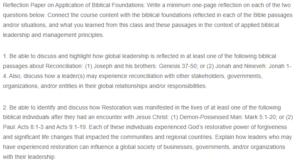GL Biblical Foundation
How Global Leadership is Reflected in the Jonah and Nineveh: Jonah 1-4 Passage and Experiencing Reconciliation With Other Stakeholders, Governments, Organizations, Or Entities
Global leadership includes operating in an international environment characterized by people from different ethnic and racial backgrounds. In Jonah 1-4, Jonah was sent to Nineveh to preach to the people, but he decided to flee to Tarshish (Nelson, 2005). The biblical passage reflects the concept of a global mindset. Jonah’s mission required him to move to a different city, hence exposing him to a different and diverse environment. This demonstrates that global leadership requires a global mindset to coexist peacefully and lead people whose beliefs and practices may vary from what a leader is accustomed to. According to Bhagat (2017), a global mindset is a set of individual communication skills, qualities, and actionable knowledge that empowers individuals to influence multicultural groups, individuals, and organizations. Preaching the people of Nineveh would require Jonah to be able to control the people in the city so that they would listen to him. Hire our assignment writing services in case your assignment is devastating you.
According to Goebel (2020), the global environment is influenced by many stakeholders, organizations, entities, and governments. A global leader also has a set of responsibilities that should be met to influence multicultural groups and individuals effectively. Therefore, a leader may experience Reconciliation with stakeholders by engaging them in decision-making based on their needs and expectations. A global leader may also share Reconciliation with the government based on government regulations influencing their leadership (Nolan, 2014). They may discuss policies the government should create to improve the business environment. Organizations and entities in the global climate may also interact through collaboration or competition (Castañer & Oliveira, 2020). Therefore, a global leader may experience Reconciliation with other organizations and entities when establishing operation mechanisms that eliminate unfair competition and exploring alliances such as mergers and acquisitions to enhance performance.
How Restoration was Manifested in the Lives of the Demon-Possessed Man in Mark 5:1-20 and How Leaders Who Experience Restoration Influence a Global Society
Restoration includes reinstating something to its earlier state. It aims to achieve a satisfactory state by giving back what had been lost. In Mark 5:1-20, Jesus cast out demons from a man who had begged him not to torment him (Nelson, 2005). Restoration is manifested in the man’s life because he was freed from the misery of living among the tombs and being isolated from the community. He was also relieved from the suffering he was going through, which included cutting himself with stones and crying out. The man also experienced Restoration because he was brought from an unsatisfactory state to a satisfactory one since he would be reintegrated into society and no longer have to live in fear of being bound by chains and shackles. The encounter transformed his life into a more favorable position, and he began living a new life. The encounter also changed people’s perception of him because he would no longer be perceived as a demon-possessed man but as one of the people who had experienced Jesus’ mercy.
The biblical passage demonstrates the impact of good leadership on followers. Leaders who may have experienced Restoration can influence a global society of businesses, governments, and organizations with their leadership in different ways. For example, leaders who have experienced Restoration believe in transformation, thus embracing transformational leadership. According to Lowe & Bathula (2019), transformational leadership focuses on change. Therefore, leaders can use the transformational mindset to develop ideas on how the global society can be improved. For instance, they may change people’s mindsets toward each other by encouraging collaboration, which fosters diversity and inclusion. Leaders who may have experienced Restoration also believe that everything is possible. Therefore, they motivate their followers to focus on achieving the desired outcome despite the challenges they may encounter.
References
Bhagat, R. S. (2017). Global Mindset and the Global Organization. Oxford Scholarship Online. https://doi.org/10.1093/acprof:oso/9780190241490.003.0008
Castañer, X., & Oliveira, N. (2020). Collaboration, coordination, and cooperation among organizations: Establishing the distinctive meanings of these terms through a systematic literature review. Journal of Management, 46(6), 965–1001. https://doi.org/10.1177/0149206320901565
Goebel, Z. (2020). Global leadership talk. Global Leadership Talk, 115–138. https://doi.org/10.1093/oso/9780190845049.003.0007
Lowe, K. B., & Bathula, H. (2019). Charismatic and transformational leadership. Management. https://doi.org/10.1093/obo/9780199846740-0160
Nelson, T. (2005). NKJV, holy Bible, eBook: Holy Bible, New King James Version. Thomas Nelson.
Nolan, R. L. (2014). Executive team leadership in the Global Economic and Competitive Environment. https://doi.org/10.4324/9781315747842
ORDER A PLAGIARISM-FREE PAPER HERE
We’ll write everything from scratch
Question 
Reflection Paper on Application of Biblical Foundations: Write a minimum one-page reflection on each of the two questions below. Connect the course content with the biblical foundations reflected in each of the Bible passages and situations, and what you learned from this class and these passages in the context of applied biblical leadership and management principles.

GL Biblical Foundation
1. Be able to discuss and highlight how global leadership is reflected in at least one of the following biblical passages about Reconciliation: (1) Joseph and his brothers: Genesis 37-50; or (2) Jonah and Nineveh: Jonah 1-4. Also, discuss how a leader(s) may experience Reconciliation with other stakeholders, governments, organizations, and entities in their global relationships and responsibilities.
2. Be able to identify and discuss how Restoration was manifested in the lives of at least one of the following biblical individuals after they had an encounter with Jesus Christ: (1) Demon-Possessed Man: Mark 5:1-20; or (2) Paul: Acts 8:1-3 and Acts 9:1-19. Each of these individuals experienced God’s restorative power of forgiveness and significant life changes that impacted the communities and regional countries. Explain how leaders who may have experienced Restoration can influence a global society of businesses, governments, and organizations with their leadership